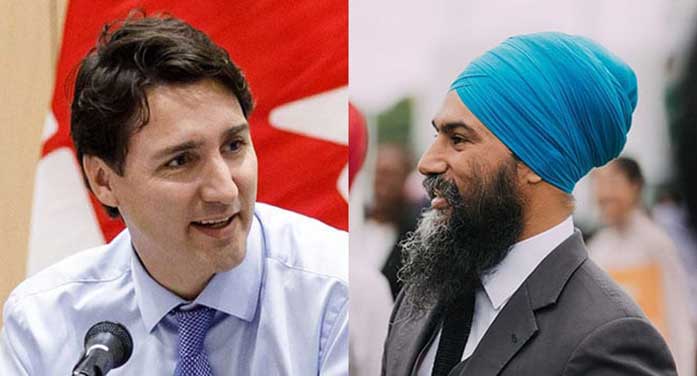 In March, the federal Liberal and New Democratic parties agreed to a deal that would keep Justin Trudeau as prime minister until 2025.
In March, the federal Liberal and New Democratic parties agreed to a deal that would keep Justin Trudeau as prime minister until 2025.
In return for policies that would increase spending on dental and pharmaceutical care and continue to strangle the oil industry, the NDP promised not to support any non-confidence motions against the Liberals for the foreseeable future.
During the 2021 election, NDP Leader Jagmeet Singh called Trudeau “bad for Canada” and “an abject failure.” But now the two lean on each other for survival.
It’s easy to see why they made the new pact. The Liberals won the smallest percentage of ballots cast for any government in Canadian history and were beaten by the Conservatives in the popular vote for the second election in a row.
The NDP under Singh has gained no traction since the death of former leader Jack Layton and needs to replenish its finances. Neither party wants an early election.
But is this arrangement in the long-term interest of the NDP?
The history of such political marriages may provide an answer. Outside of wartime, genuine coalition governments in the Westminster system are rare. The most recent example, the Conservative/Liberal Democrat arrangement in Great Britain in 2010, resulted in the junior partner being a big loser at the next election. Food for thought there, Mr. Singh.
Far more common in Canada is Liberal/NDP “co-operation.” Lester Pearson, Pierre Trudeau and Paul Martin all ran minority governments with NDP support in the House of Commons.
Though NDP voters may have benefited from the increased social spending (the coin with which the Liberals paid for left-wing support in the House), the party didn’t necessarily benefit at the next election for propping up the Liberals.
Singh’s NDP is not my father’s NDP by Kerry Diotte
How the NDP can hope to be competitive when it is devoutly anti-energy is beyond me
Are NDP supporters getting fed up with Jagmeet Singh? by Michael Taube
He seems unaware of key issues. That can hardly give party supporters confidence in his abilities
Throughout the 1960s and ’70s, the NDP either lost seats or gained minimally following their deals. The election of 2006 gave them a boost, while the 2021 vote won them only a single additional seat. Clearly, playing little brother to the Liberals is not necessarily a winning strategy for a party that hopes to be seen as capable of forming a government on its own.
This is particularly true at a time when the NDP appears to have been outflanked on the left – and not by the Green fringe. Under Trudeau, the Liberals have plunged far into traditional socialist territory. In terms of unbridled deficit spending, crippling the carbon economy, massively funding Indigenous groups, shrugging off our defence commitments, genuflecting on all “social justice” issues, and being willing to vilify opponents as racists and bigots, there’s little to choose between the parties.
If that’s the case, what’s the argument for the continued existence of the NDP?
They have long since ceased to be the voice of the blue-collar working class or of Prairie populists. They have zero chance of making inroads in Quebec as long as Singh is the face of the party. Elsewhere they struggle for the same urban, middle-class, CBC-listening, public-sector-union voter that the Liberals aim at.
Unless the Liberals panic in 2025 at the prospect of a Conservative victory, jettison Justin and claw their way back to the centre of the political spectrum, leaving space for the NDP on the left again, the party of Tommy Douglas and Layton may join Social Credit, the Progressive Conservatives and the United Farmers in the Museum of Defunct Parties.
Gerry Bowler, a Canadian historian, is a Senior Fellow at the Frontier Centre for Public Policy.
Gerry is a Troy Media Thought Leader. For interview requests, click here.
The opinions expressed by our columnists and contributors are theirs alone and do not inherently or expressly reflect the views of our publication.
© Troy Media
Troy Media is an editorial content provider to media outlets and its own hosted community news outlets across Canada.

